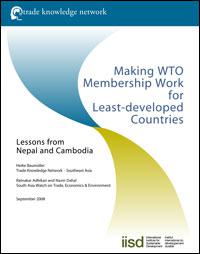| 来源类型 | Paper
|
| 规范类型 | 论文
|
| Making WTO Membership Work for Least-Developed Countries: Lessons from Nepal and Cambodia |
| Heike Baumüller; Ratnakar Adhikari; Navin Dahal
|
| 发表日期 | 2008-09
|
| 出版者 | IISD
|
| 出版年 | 2008
|
| 页码 | 17
|
| 语种 | 英语
|
| 概述 | This policy brief reviews Nepal's and Cambodia's experience during the accession process, examines the countries' accession commitments and... |
| 摘要 |
This policy brief reviews Nepal's and Cambodia's experience during the accession process, examines the countries' accession commitments and provides a preliminary assessment of how the countries have fared since WTO membership. Several lessons have emerged from the analysis, which can help other acceding LDCs replicate the successful strategies and avoid some of the mistakes in an effort to gain maximum benefit from their WTO membership.
Key findings:
-
The accession process for WTO membership was strenuous and time-consuming. Despite a stated commitment by WTO members to simplify and streamline the negotiating process for LDCs, Nepal and Cambodia had to complete the same complex steps as non-LDCs.
-
Despite an assurance by the WTO membership to exercise restraint in seeking concessions and commitments on trade in goods and services from acceding LDCs, Nepal and Cambodia's commitments are more stringent than incumbent LDC members and even some developing country members.
-
The (albeit limited) technical assistance Nepal and Cambodia received during their accession process proved vital to prepare the complex documentation and build the capacities of the private sector and government officials on WTO issues. In contrast, the technical assistance that the countries received after WTO membership has been inadequate.
-
Both countries are seriously struggling with effective and timely implementation of their accession obligations. In the absence of an international monitoring mechanism and enforcement of compliance deadlines (combined with inadequate technical assistance), momentum for implementing commitments has virtually been lost.
-
Compared with the commitments made by Cambodia, Nepal was able to negotiate more favourable terms of accession. This was possible due to stakeholder participation on and the technical assistance Nepal received during the accession process. Nevertheless, even in Nepal, the majority of stakeholders felt they were left out of the accession process. Moreover, interaction between the government and the stakeholders has not continued since WTO accession.
Key recommendations:
-
There is an urgent need to translate members' commitment to simplify the accession process for LDCs into action. In particular, the WTO should incorporate a specific provision that acceding LDCs will not be required to enter into bilateral negotiations on market access.
-
Acceding LDCs should not be asked to undertake higher levels of commitments than those made by the founding LDCs of the WTO. Also, acceding LDCs should only be required to implement specific commitments in services, once the necessary domestic regulations are in place.
-
More emphasis needs to be placed on providing technical assistance to implement LDCs' accession commitments. In order to make technical assistance binding, implementation of these commitments should be made conditional on the receipt of timely and effective assistance.
-
Progress in implementing accession commitments should be reviewed regularly by the WTO, including the availability and effectiveness of requested technical assistance, and new deadlines should be set when old ones have been missed.
-
There is also a need for enhanced technical assistance to enable LDC Members to harness the potential benefits of WTO membership as a tool for promoting human development, including by addressing supply-side constraints and export diversification.
-
To enhance the ownership of the WTO accession and implementation processes, acceding countries should be supported to put in place a formal, institutionalized mechanism for involving all stakeholders in the process.
|
| URL | https://www.iisd.org/library/making-wto-membership-work-least-developed-countries-lessons-nepal-and-cambodia
|
| 来源智库 | International Institute for Sustainable Development (Canada)
|
| 资源类型 | 智库出版物
|
| 条目标识符 | http://119.78.100.153/handle/2XGU8XDN/56903
|
推荐引用方式
GB/T 7714 |
Heike Baumüller,Ratnakar Adhikari,Navin Dahal. Making WTO Membership Work for Least-Developed Countries: Lessons from Nepal and Cambodia. 2008.
|
|
文件名:
|
tkn_making_wto_membership_work.jpg
|
|
格式:
|
JPEG
|

|
文件名:
|
tkn_making_wto_membership_work.pdf
|
|
格式:
|
Adobe PDF
|
除非特别说明,本系统中所有内容都受版权保护,并保留所有权利。